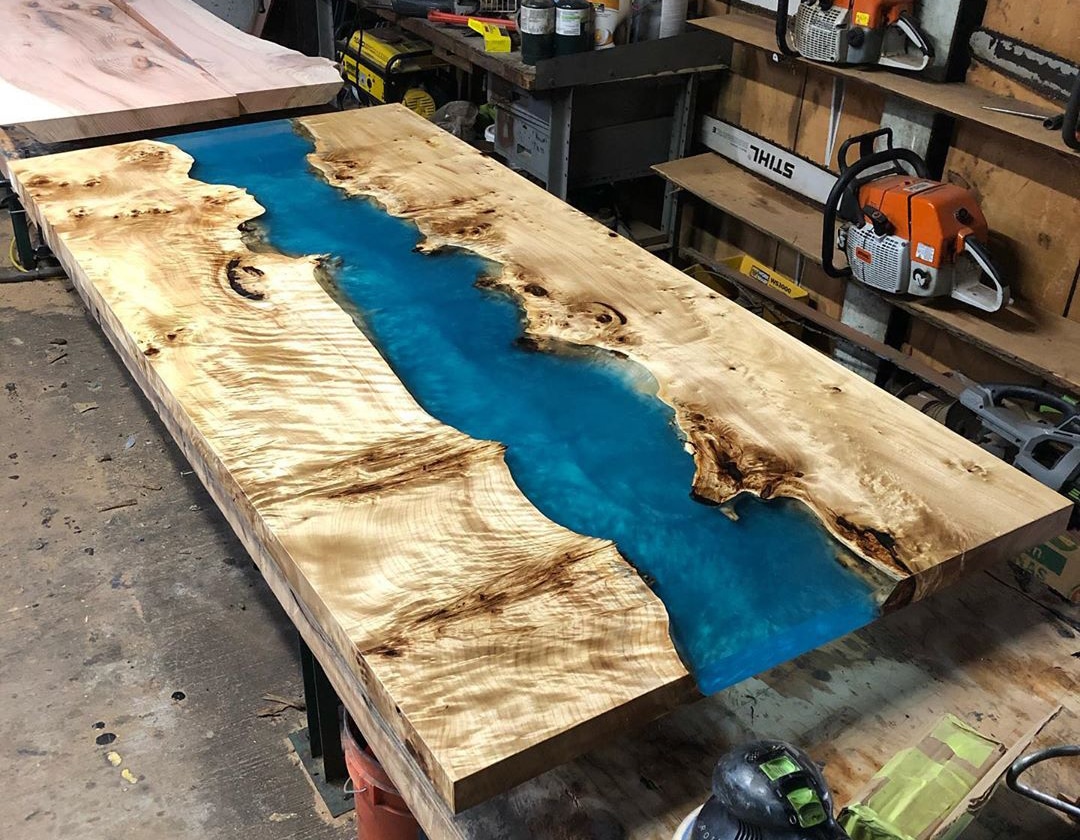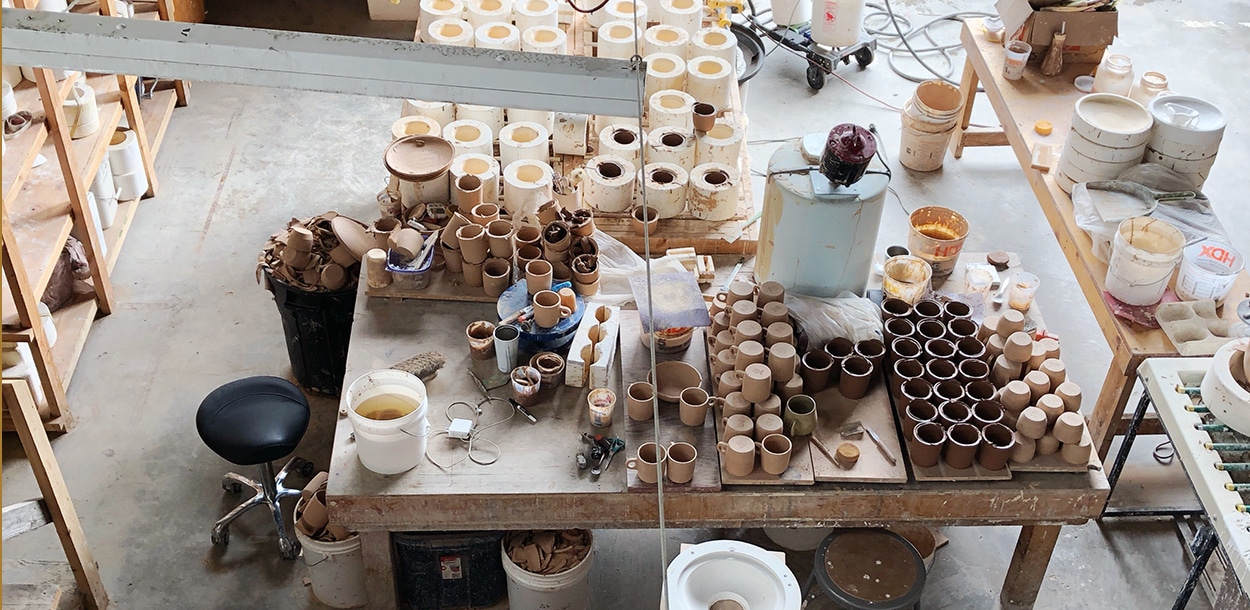Creative collaborative housing initiatives are on the rise, allowing people to temper the effects of an unaffordable housing market and surround themselves with like-minded creatives. So-called “maker villages” are springing up in places including the United States, France, and the Netherlands.
Housed on the site of a former oxygen plant in West Oakland, California, O2 Artisans Aggregate bills itself as an eco-industrial park that is “home to a network of artisans working collectively to develop and promote environmentally progressive projects,” according to its website. Paul Discoe of Joinery Structures founded the community, which houses a variety of shops and studios, including a sawmill, a community composting hub, a sake brewery, and a “snackeria” focusing on the indigenous foods (including insects) of the pre-Columbian era. The public can visit the studios (email them for details), and 02AA hosts an annual Open Studios & Craft Fair. According to blacksmith Jay Morgan, the collective would like to hold regular Open Houses in the future. The intimate connections forged between artisans are at the heart of the community, however. “There [are] people that are just super talented at what they do and we’re all able to kind of be in the same yard and kind of help each other out,” says blacksmith Jay Morgan.
Independent ceramicist Stephanie Intelisano agrees. She joined O2AA when she needed space to work on a commission and felt ready to manage her own shop. “Joining this collective has been a transformative experience for me and my work,” she says. “At first I was hesitant to be the only ceramicist in a studio setting but have found nothing [but] support from the community here. I also love being around craftspeople, artists, and fabricators that work in different mediums than me at such a high skill level.”
The first time Jay Morgan forged iron, he found it exhilarating and immediately wanted to do it again. So he loaded up an RV and left Connecticut — and a career in graphic design — to forge a new life in Oakland. He now makes knives in a studio at 02AA, which he calls “the yard.” Says Morgan, “The yard allowed me to essentially move to the most expensive real estate market in the country and practically start my career over and it’s kind of given me a place to re-establish myself and it’s been amazing.”
Besides supporting its artisans, O2AA is dedicated to sustainable initiatives. A few years ago, Paul Discoe asked Michael Veneziano, an arborist with more than 35 years of experience, to take over the on-site mill, and Veneziano also took an ownership stake in 02AA. Since then Veneziano has pioneered several sustainability initiatives through his company Ponderosa Millworks, which takes urban trees that have been cut down and turns them into beautiful slabs. “One part of it is diverting those trees from the waste stream,” and another aspect of his initiative involves the reuse of sawdust, which he gives away “to local gardeners and landscapers and to Pollinate, which is a business in Oakland that teaches people how to keep bees and keep chickens… So there really is a lot of connection,” according to Veneziano. The relationships among the artisans are palpable. When interviewed separately, Veneziano mentioned Morgan, and Morgan mentioned Veneziano, who sometimes supplies him with wood for knife handles.

Oakland is not the only city where innovative maker villages can be found. Along a once-neglected strip of land next to a railroad track in Utrecht, Netherlands, a unique tiny house community has emerged to fill a creative void. Co-founded by Biana Ernst, Hof van Certesius is a set of interconnected tiny houses that serve as studios for local artisans, entrepreneurs, and educators. In an interview for EU Green Week 2018, Ernst explained the concept. There are woodworkers, metalworkers, and a furniture designer. A bakery makes bread using the leftover malt from a nearby brewery, while a vegetable garden hosts educational workshops for local children. A free co-working space provides an inviting atmosphere for the public to come and work.
Sustainability is at the core of the Hof van Certesius. The houses are made of 90 percent recycled materials, and many of the materials are leased so that after 20 years, they can be reused. Principles of great design were applied within a sustainable context. The design of the urban village fosters an open, collaborative community, as each interconnected tiny house features large glass windows looking out on an inner courtyard. During the next 20 years, Hof van Cartesius will expand, building three more villages but keeping its membership capped at 100 people so they can maintain a sense of intimacy.
If Hof van Certesius is intimate, DARWIN is expansive. When the former Army barracks in Bordeaux, France shuttered in 2005 and fell into disrepair, founders Philippe Barre and Jean-Marc Gancille took the 10,000 square meter space and converted it into DARWIN, which includes a coworking space, offices, a bar, artisanal shops, and a grocery store selling more than 10,000 organic products. Taking its name from Charles Darwin, the space, which opened in 2008, is built around the idea of adaptation and evolution. By day, “Les Chantiers de la Garonne” or “The Garonne Shipyards” are the domain of a local nautical club. But by night, the space — a former shipyard that manufactured wooden boats — transforms into a bar, serving Darwin-branded beer. Barre and Gancille have faced criticism for having ties to corporations that are not known to be eco-friendly and they lack the permits for certain areas, including the skate park. Despite the controversy, grassroots sustainability initiatives are thriving in the space. L’Étincelle is a bike repair shop that also sells hand-built bikes for €150-400 ($165-440 USD). Guided by a vow to never let a bike go into the garbage, the shops reuses bike parts so virtually nothing goes to waste.
Maker villages are having an impact in cities across the globe, empowering local artists through resource sharing and the cultivation of a creative community bound by shared values. When speaking of her maker village 02AA, the ceramicist Intellisano said, “It pushes me to work harder and opens the door for collaboration in ways I didn’t consider previously.”
##
This post is part of our Winter 2019 editorial series on waste reduction. Get our free ebook on this series: “Beyond Waste: Community Solutions to Managing Our Resources.” Shareable is a partner of this project with Greenpeace.
Take a look at the other articles in the series:
-
- Celebrate the radical power of DIY during MAKE SMTHNG Week
- Communities worldwide prepare to host MAKE SMTHNG Week events
- Fashion Detox Challenge invites people to pause, reflect and change
- How the MyMizu app is creating community and fostering sustainability in Japan
- Bring sustainability to the party with reusable party packs
- Right to Repair movement invites us to review the way we produce and consume electronics
- Using ancient values to solve modern problems at the Eunpyeong Sharing Center
- Community cupboards feed neighborhoods despite legal hurdles









